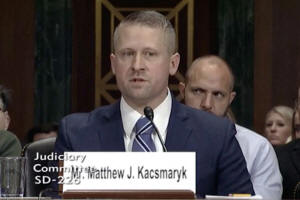Texas judge in abortion pill lawsuit often rules for conservatives
 Send a link to a friend
Send a link to a friend
 [April 10, 2023]
By Nate Raymond [April 10, 2023]
By Nate Raymond
(Reuters) - The federal judge who on Friday suspended approval of the
abortion pill mifepristone is a former Christian legal activist whose
small courthouse in Amarillo, Texas, has become a go-to destination for
conservatives challenging Biden administration policies.
U.S. District Judge Matthew Kacsmaryk, an appointee of former Republican
President Donald Trump, had a long track record of opposing abortion and
LGBTQ rights before the U.S. Senate confirmed him in 2019 to a
life-tenured position as a federal judge.
Now on the bench, he has routinely ruled against Democratic causes.
Since October alone, Kacsmaryk has blocked an end to Trump's "Remain in
Mexico" immigration program and ruled against Biden administration
policies designed to protect LGBTQ people from discrimination in the
workplace and at doctors' offices.
Kacsmaryk did not respond to a request for comment.
When anti-abortion groups in November filed a lawsuit challenging the
U.S. Food and Drug Administration's more than two-decade old approval of
the abortion pill mifepristone, they filed in Amarillo, guaranteeing the
case would be heard by Kacsmaryk.

Although his ruling on Friday was preliminary and not on the merits of
the case, Kacsmaryk indicated he thought the challenge was substantially
likely to succeed. He said that the FDA had ignored risks in approving
the drug.
His ruling used language common in anti-abortion circles. Mifepristone,
he said, is used to "kill unborn humans." He disclaimed the use of the
word "fetuses" as "inaccurately describing unborn humans," noting they
might be "persons" entitled to equal protection rights. He also
described some of the defense arguments as supporting "eugenics."

Josh Blackman, a conservative law professor at South Texas College of
Law who knows Kacsmaryk, compared his judicial philosophy to that of two
of the U.S. Supreme Court's most conservative justices, Justice Clarence
Thomas and Samuel Alito.
"He's not a moderate," Blackman said.
'SHADOWY PENUMBRAS'
Kacsmaryk left a position as a federal prosecutor in 2014 to join the
Christian legal group First Liberty Institute, where as its deputy
general he fought against LGBTQ anti-discrimination protections,
same-sex marriage and abortion rights.
In that role, he called abortion rights supporters "sexual
revolutionaries" in a 2015 article that was critical of the 1973 Supreme
Court Roe v. Wade decision, which had guaranteed a national right to
abortion, until the high court overturned it last year.
Kacsmaryk called Roe v. Wade a ruling in which "seven justices of the
Supreme Court found an unwritten 'fundamental right' to abortion hiding
in the due process clause of the Fourteenth Amendment and the shadowy
'penumbras' of the Bill of Rights, a celestial phenomenon invisible to
the non-lawyer eye."
During his time with the Christian legal group, he helped oppose a
federal mandate that employer-provided health insurance cover women's
birth control, and fought a Washington state law requiring pharmacists
to stock a "representative assortment of drugs" to meet patient needs,
including emergency contraception medications.
His nomination to the bench was part of a push during Trump's tenure to
tilt the judiciary to the right. Trump got a near-record 234 judicial
nominees confirmed, including Kacsmaryk, who like many other Trump
appointees belongs to the conservative Federalist Society.
[to top of second column]
|

Matthew Kacsmaryk, deputy counsel for
the First Liberty Institute, answers questions during his nomination
hearing by the U.S. Senate Committee on the Judiciary at the Dirksen
Senate Office Building in Washington, U.S. December 13, 2017 in a
still image from video. Pool via REUTERS

Facing fierce opposition from LGBTQ groups and Democrats, Kacsmaryk
testified before a December 2017 Senate Judiciary Committee that it
would be "inappropriate" for judges to allow their religious
convictions to influence their rulings.
He won Senate confirmation on a party-line 52–46 vote in 2019, with
only one Republican, Senator Susan Collins of Maine, voting against
him at the time, citing his "alarming bias" against LGBTQ people.
FAVORED VENUE
Since then, his courthouse has become a favored venue for
conservative legal activists and Republican state attorneys general
pursuing lawsuits seeking to halt aspects of Democratic President
Joe Biden's agenda - often with success.
In October, Kacsmaryk vacated Biden administration guidance
requiring employers to allow transgender workers to dress and use
bathrooms consistent with their gender identities.
A month later, he ruled the U.S. Department of Health and Human
Services under Biden had wrongly interpreted a provision of the
Affordable Care Act as barring healthcare providers from
discriminating against gay and transgender people.
Kacsmaryk has also ruled for birth control foes, ruling in December
that allowing minors to obtain free contraception though the Title X
federal program without parental consent was unlawful.
He is currently presiding over a lawsuit filed by the anti-vaccine
group Children's Health Defense and others accusing media companies,
including Reuters, of violating federal antitrust laws by working
with tech companies to censor information about COVID-19. A Reuters
spokesperson has denied the allegations.
The fact that conservatives have been able to steer so many cases to
Kacsmaryk's courthouse in the 14th largest city in Texas involves an
obscure local order that assigns 95% of federal civil cases to him,
its lone judge.
The order virtually guarantees litigants suing in Amarillo get
Kacsmaryk and not any of the 12 other active judges in the Northern
District of Texas, which also covers Dallas, Fort Worth and other
cities.
The Biden administration has sought to transfer at least one case
away from Kacsmaryk, accusing a group of Republican state attorneys
general of "judge shopping" by filing a lawsuit challenging a rule
that allows socially conscious investing by employee retirement
plans in Amarillo to get Kacsmaryk. The judge rejected the
administration's bid to move that case in late March, saying it had
provided no evidence that the litigation did not belong in his court
or that plaintiffs were attempting to manipulate the process.
While the district's chief judge could order cases be reallocated,
he has not. Supporters of the current practice note that it ensures
someone living in Amarillo and suing there does not need to drive
five-plus hours to Dallas for a court hearing.

Sarah Lipton-Lubet, executive director of the progressive legal
advocacy group Take Back the Court said, "conservative litigants
know that they can make all sorts of outlandish arguments, because
they know that right wing judges, and this judge in particular, are
going to be receptive."
(Reporting by Nate Raymond in Boston, Editing by Alexia Garamfalvi,
Bill Berkrot and Diane Craft)
[© 2023 Thomson Reuters. All rights
reserved.]This material may not be published,
broadcast, rewritten or redistributed.
Thompson Reuters is solely responsible for this content. |